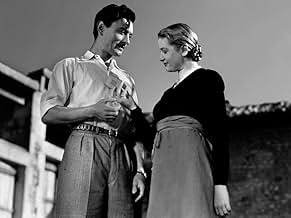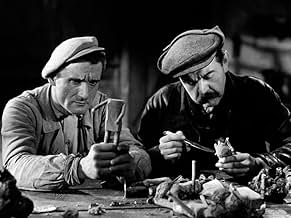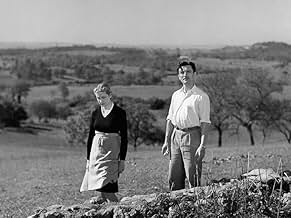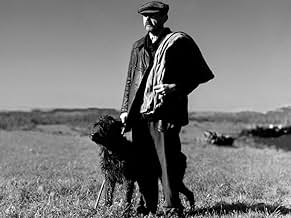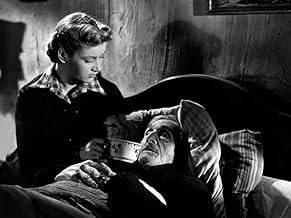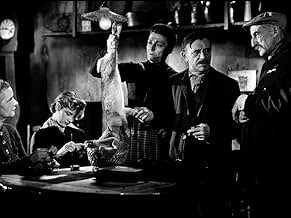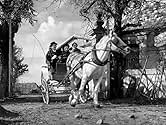VALUTAZIONE IMDb
7,5/10
1136
LA TUA VALUTAZIONE
Aggiungi una trama nella tua linguaIn a lost French village, an old woman is killed and her savings stolen. Several members of her family, all called "Goupi", are suspected.In a lost French village, an old woman is killed and her savings stolen. Several members of her family, all called "Goupi", are suspected.In a lost French village, an old woman is killed and her savings stolen. Several members of her family, all called "Goupi", are suspected.
- Regia
- Sceneggiatura
- Star
- Premi
- 1 vittoria in totale
Albert Rémy
- Jean des Goupi
- (as Rémy)
Georges-François Frontec
- Bit Part
- (non citato nei titoli originali)
Maurice Marceau
- Un porteur à la gare
- (non citato nei titoli originali)
Recensioni in evidenza
This is actually a very subversive film, given the circumstances and the date (1943) at which it was made. It is set in the Charente, which is a region a little to the east of La Rochelle, and not too far from the cities of Limoges and Poitiers. As such it was close (if not on) the border between the zone of (German) occupation and Vichy France. Although this film consists mostly of interiors there are enough outdoor scenes (all shot in what looks like late autumn or early winter) to give a real feel for the countryside.
Vichy (which had a reduced jurisdiction over occupied France) sunk a very large amount of political capital into the promotion of a 'certain idea of France' - that's De Gaulle's phrase, however, not Petain's). That 'idea' was of a rejuvenated nation, that case aside the infamous corruption of the Third Republic, and which gave pride of place to morality, (Roman Catholic) religion and country - specifically the countryside, rather than the cities (which were nests of subversives and Semites, so-called). It was a form of the 'integral nationalism' promoted by Charles Maurras, but with Petain as a substitute monarch.
However, here is a film which deliberately sets the city (in the person of the naive store clerk, Eugene, played by the young Georges Rollin) against his rather wicked rural relatives, complete with a tipsy, centenarian patriarch (Maurice Schultz). It turns into a rather interesting detective story, but one with a very literary style.
I imagine that it slipped through the censor's scissors only because of the portrayal of the Parisian Eugene as witless and rather feckless - almost a pawn in the hands of his unscrupulous uncles and cousins. Yet the film is much more savage towards the peasants, who are really a gallery of grotesques. They are superstitious, opportunistic, entirely selfish, idle and grasping - it is almost like one of Guy de Maupassant's caricatures of the narrow-minded and bigoted Norman farmers and petit-bourgeois. So the enormous propaganda push by Vichy to elevate 'la France profonde' to mystical status is here either ridiculed or simply disregarded. This is really a film about characterisation rather than plot, and the cast (led by the excellent Fernand Ledoux) are first rate.
It is a pity that Jacques Becker was not able to keep up the good work in the postwar years - films like "Ali Baba" (with Fernandel), "Montparnasse 19" and "Arsene Lupin" for the most part didn't measure up to "Goupi Mains Rouges" or "Casque d'Or". Perhaps it is true that the restraints of a repressive culture and regime do make for a better and more subtle product.
Vichy (which had a reduced jurisdiction over occupied France) sunk a very large amount of political capital into the promotion of a 'certain idea of France' - that's De Gaulle's phrase, however, not Petain's). That 'idea' was of a rejuvenated nation, that case aside the infamous corruption of the Third Republic, and which gave pride of place to morality, (Roman Catholic) religion and country - specifically the countryside, rather than the cities (which were nests of subversives and Semites, so-called). It was a form of the 'integral nationalism' promoted by Charles Maurras, but with Petain as a substitute monarch.
However, here is a film which deliberately sets the city (in the person of the naive store clerk, Eugene, played by the young Georges Rollin) against his rather wicked rural relatives, complete with a tipsy, centenarian patriarch (Maurice Schultz). It turns into a rather interesting detective story, but one with a very literary style.
I imagine that it slipped through the censor's scissors only because of the portrayal of the Parisian Eugene as witless and rather feckless - almost a pawn in the hands of his unscrupulous uncles and cousins. Yet the film is much more savage towards the peasants, who are really a gallery of grotesques. They are superstitious, opportunistic, entirely selfish, idle and grasping - it is almost like one of Guy de Maupassant's caricatures of the narrow-minded and bigoted Norman farmers and petit-bourgeois. So the enormous propaganda push by Vichy to elevate 'la France profonde' to mystical status is here either ridiculed or simply disregarded. This is really a film about characterisation rather than plot, and the cast (led by the excellent Fernand Ledoux) are first rate.
It is a pity that Jacques Becker was not able to keep up the good work in the postwar years - films like "Ali Baba" (with Fernandel), "Montparnasse 19" and "Arsene Lupin" for the most part didn't measure up to "Goupi Mains Rouges" or "Casque d'Or". Perhaps it is true that the restraints of a repressive culture and regime do make for a better and more subtle product.
Adapted by Pierre Véry from his own novel and directed by Jacques Becker this is a splendidly low key satire on rural life and a highly unflattering portrait of cunning Charentais peasants whose family name is Goupi and whose family values are based upon the making and hoarding of money.
Although verging on the caricature the performances are by a cast that is wonderfully 'true' and whose quality is one that it would be virtually impossible to replicate now, notably Fernand Ledoux as the title character, Arthur Dévere as Goupi-Mes sous and the infamous but brilliant Robert le Vigan as the deranged Goupi-Tonkin.
It is a mixture of murder mystery and black comedy and despite being gloriously subversive for its time, one can only assume that it was spared the same fate that befell the equally subversive 'Le Corbeau' by virtue of the final scene which artfully espouses the Pétainist values of 'Travail, Famille et Patrie'.
This is the third of Becker's thirteen films, the best of which are among the best that French Cinema has to offer and for what it's worth he became one of the few Old Guard directors to be given the seal of approval by the New Ripple brigade.
Although verging on the caricature the performances are by a cast that is wonderfully 'true' and whose quality is one that it would be virtually impossible to replicate now, notably Fernand Ledoux as the title character, Arthur Dévere as Goupi-Mes sous and the infamous but brilliant Robert le Vigan as the deranged Goupi-Tonkin.
It is a mixture of murder mystery and black comedy and despite being gloriously subversive for its time, one can only assume that it was spared the same fate that befell the equally subversive 'Le Corbeau' by virtue of the final scene which artfully espouses the Pétainist values of 'Travail, Famille et Patrie'.
This is the third of Becker's thirteen films, the best of which are among the best that French Cinema has to offer and for what it's worth he became one of the few Old Guard directors to be given the seal of approval by the New Ripple brigade.
27-year-old Georges Rollin get called back from Paris by his father to their farm/inn, none of which he has seen for 25 years. He doesn't know why, but it turns out his father wants to consolidate the fortune of both branches of the family by marrying him to his cousin Blanchette Brunoy, despite the fact she and another cousin, Robert Vignon are getting it on. On arrival, he's scared out of his wits by an uncle, discovers his great-grandfather's corpse, is accused of murdering an aunt and stealing the mysterious family fortune.
A typical French country family, you'd say, particularly if you're fond of TOBACCO ROAD. Every one of them has a nickname that everyone in the town knows about to exclusion of actually knowing their real names: Goupi Monsieur or Goupi Le Loi or Goupi Mains Gauches and they don't get along particularly well, but unite against outsiders. As the movie went along, it got darker and darker, and I thought director Jacques Becker had made a Clouzot-style picture. Was he trying to get himself banned, too?
Well, you'll have to see how it turns out. It's certainly entertaining, and familiar enough if you come from a large family.
A typical French country family, you'd say, particularly if you're fond of TOBACCO ROAD. Every one of them has a nickname that everyone in the town knows about to exclusion of actually knowing their real names: Goupi Monsieur or Goupi Le Loi or Goupi Mains Gauches and they don't get along particularly well, but unite against outsiders. As the movie went along, it got darker and darker, and I thought director Jacques Becker had made a Clouzot-style picture. Was he trying to get himself banned, too?
Well, you'll have to see how it turns out. It's certainly entertaining, and familiar enough if you come from a large family.
This is Jacques Becker's second effort and the first one that really counts.Along with "casque d'or" ,"rendez-vous de juillet" and "le trou",it may be his finest work,and for sure one of the classics of the French cinema,one of these that you can watch and watch again without being tired.
The scenarist Pierre Very,is,along with Boileau-Narcejac,the best French suspense writer,and he outdoes himself here,creating an absorbing plot,a magic atmosphere,and a dozen of colorful characters .Out in the sticks,lives the Goupi family:actually a clan who's got its own laws and in which strangers are looked upon pretty much as enemies.In this strange family,every member has got a nickname,each one of them beginning with Goupi:Goupi-mes-sous,Goupi-Muguet,Goupi-Tonkin,of course Goupi-mains -rouges (Goupi-red-hands),and more.One fine day,a young man arrives from Paris :this is the first time he has come in this lost country,to visit his family.His late mother had escaped the Goupi clan,being unable to stand this place cut off the world.Needless to say,coming from the City,he's not welcome.The plot thickens when a Goupi wicked woman is murdered and the patriarch has a stroke and is no longer able to indicate where the family pile is hidden.
Jacques Becker created a very strange atmosphere,mainly during the first part:when the young man arrives ,he's taken by his uncle Goupi-Mains-Rouges to a scary place full of stuffed animals and black magic. He has wonderfully depicted his peasant milieu,in which they all stand together ,and in which they would not betray one of them,even if the police investigates their home.
There is a first-class cast,including Fernand ledoux,Georges Rollin,Germaine Kerjean and Blanchette Brunoy ;but the stand out is Robert Le Vigan,who portrays a former legionnaire,slipping gradually into madness.The most famous scene of the film belongs to him:pursued by the police,he climbs upon a tree,higher and higher,trying to reach for this sun he used to know when he was a soldier in the Colonies.A similar character is featured in Becker's follow-up movie "Falbalas",but insanity is much more credible in "Goupi Mains Rouges".
Had Hitchcock directed a country thriller,that would have been this one.
The scenarist Pierre Very,is,along with Boileau-Narcejac,the best French suspense writer,and he outdoes himself here,creating an absorbing plot,a magic atmosphere,and a dozen of colorful characters .Out in the sticks,lives the Goupi family:actually a clan who's got its own laws and in which strangers are looked upon pretty much as enemies.In this strange family,every member has got a nickname,each one of them beginning with Goupi:Goupi-mes-sous,Goupi-Muguet,Goupi-Tonkin,of course Goupi-mains -rouges (Goupi-red-hands),and more.One fine day,a young man arrives from Paris :this is the first time he has come in this lost country,to visit his family.His late mother had escaped the Goupi clan,being unable to stand this place cut off the world.Needless to say,coming from the City,he's not welcome.The plot thickens when a Goupi wicked woman is murdered and the patriarch has a stroke and is no longer able to indicate where the family pile is hidden.
Jacques Becker created a very strange atmosphere,mainly during the first part:when the young man arrives ,he's taken by his uncle Goupi-Mains-Rouges to a scary place full of stuffed animals and black magic. He has wonderfully depicted his peasant milieu,in which they all stand together ,and in which they would not betray one of them,even if the police investigates their home.
There is a first-class cast,including Fernand ledoux,Georges Rollin,Germaine Kerjean and Blanchette Brunoy ;but the stand out is Robert Le Vigan,who portrays a former legionnaire,slipping gradually into madness.The most famous scene of the film belongs to him:pursued by the police,he climbs upon a tree,higher and higher,trying to reach for this sun he used to know when he was a soldier in the Colonies.A similar character is featured in Becker's follow-up movie "Falbalas",but insanity is much more credible in "Goupi Mains Rouges".
Had Hitchcock directed a country thriller,that would have been this one.
An effective dark comedy and satire, that sort of reminded me of a warped, angry Gallic 'You Can't Take It with You'.
An outsider, in this case a son who left years ago, returns to his family, who are a strange and twisted lot indeed. Funny, but unlike the Capra film there is a tone of creepy decadence and potential violence underlying this group of only somewhat endearing eccentrics.
There are echoes too of Renoir (for whom Becker long served as an assistant) in it's pithy, insightful look at group and class dynamics. It flags at moments, and can't compete with Becker's later and greater films, but this a rarity worth seeking out.
An outsider, in this case a son who left years ago, returns to his family, who are a strange and twisted lot indeed. Funny, but unlike the Capra film there is a tone of creepy decadence and potential violence underlying this group of only somewhat endearing eccentrics.
There are echoes too of Renoir (for whom Becker long served as an assistant) in it's pithy, insightful look at group and class dynamics. It flags at moments, and can't compete with Becker's later and greater films, but this a rarity worth seeking out.
Lo sapevi?
- QuizAward: Grand Prix du Cinéma Français 1943.
- ConnessioniFeatured in Voyage à travers le cinéma français (2016)
I più visti
Accedi per valutare e creare un elenco di titoli salvati per ottenere consigli personalizzati
- How long is It Happened at the Inn?Powered by Alexa
Dettagli
- Data di uscita
- Paese di origine
- Lingua
- Celebre anche come
- It Happened at the Inn
- Luoghi delle riprese
- Charente, Francia(Exterior)
- Azienda produttrice
- Vedi altri crediti dell’azienda su IMDbPro
- Tempo di esecuzione1 ora 44 minuti
- Colore
- Proporzioni
- 1.37 : 1
Contribuisci a questa pagina
Suggerisci una modifica o aggiungi i contenuti mancanti

Divario superiore
By what name was La casa degli incubi (1943) officially released in Canada in English?
Rispondi
